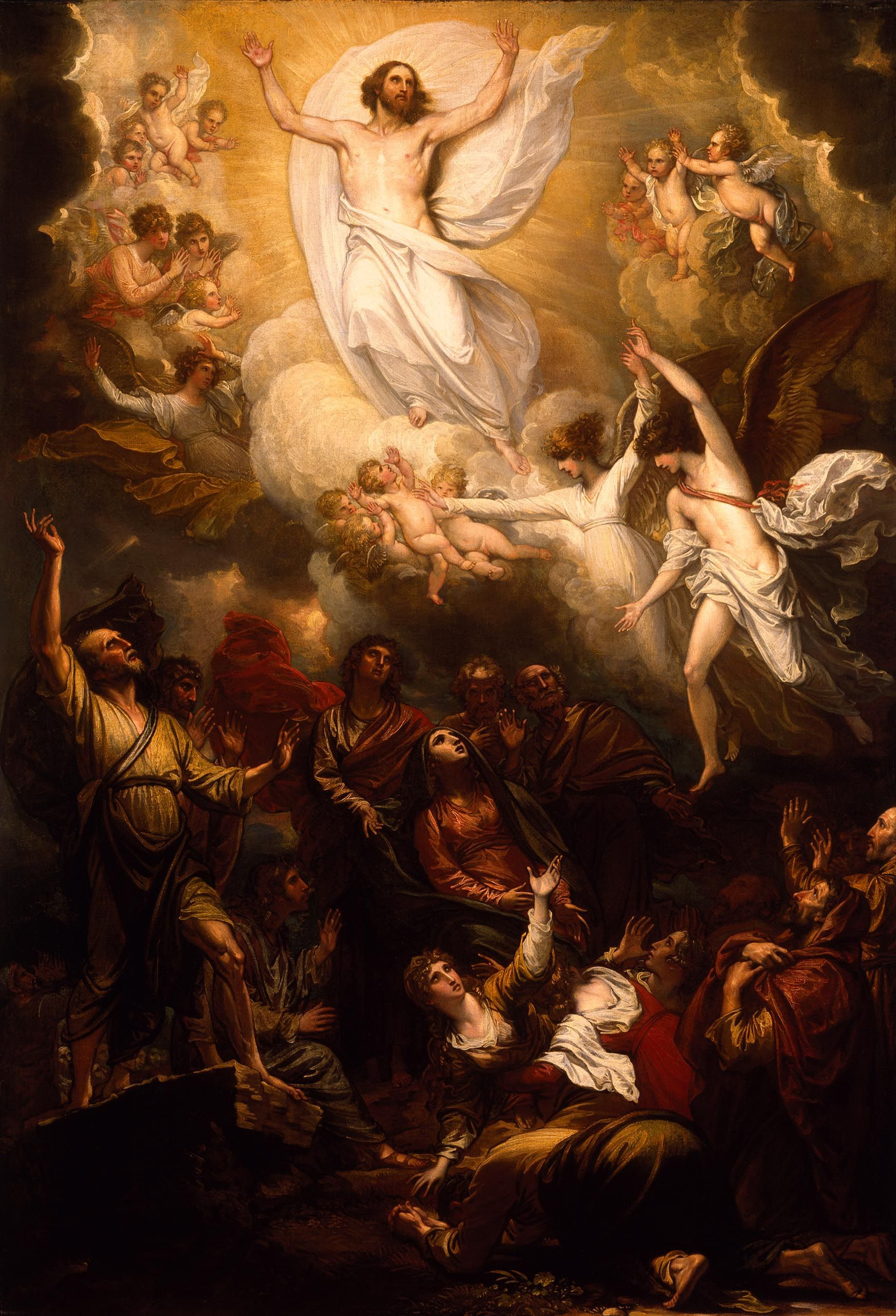[Greek] ἀναφέρω (anapherō), [Latin] offere, [Latin] ascendere: to carry up, to lead up, to bear, take up, to offer; Mt.17:1, Mk.9:2, Lk.24:51, Heb.7:27, Heb.9:28, Heb.13:15, Jas.2:21, 1Pet.2:5,24

The Ascension: painting by Benjamin West (1801)
Background information:
Greek Hellenism: This term means to bring, to raise up, to take up, to offer in sacrifice, to take on oneself, to bear (endure), and to lead up. Herodotus’ The Histories 8.32 states “It was there that they carried their goods and themselves ascended to it.” Thucydides’ The Peloponnesian War 3.38.3 states “In such contests, the state gives the rewards to others; and takes the dangers for herself.” Aeschylus’ Libation Bearers 447 states “I gave free vent to my streaming tears, which came more readily than laughter, as in my concealment I poured out my lament.” Aeschylus’ Libation Bearers 841 states “To lay this too upon our house would be a fearful burden when it is still festering and galled by the wound inflicted by an earlier murder.” Xenophon’s Symposium 8.30 states “It was not his person but his spiritual character that influenced Zeus to carry him up to Olympus.” Herodotus’ The Histories 6.30 states “Now if he had been taken prisoner and brought to the king, he would have suffered no harm, and the king would have forgiven his guilt.”
Old Testament: This term, related to several Hebrew terms, conveys the sense of offering. This term can mean to make a sin offering, to purify, to bring, to bear, to carry, to ascend, to come up, to burn, and to sacrifice. The entire ram shall then be burned on the altar, since it is holocaust, a sweet smelling oblation to the Lord (Exo.29:18). Bring forward the sacrifices and than offerings for the house of the Lord (2Chr.29:31). Then will gifts be brought to the Lord (Isa.18:7). Through His suffering, My servant shall justify many, and their guilt He shall bear (Isa.53:11). I never brought you an animal torn by wild beasts (Gen.31:39). They built high places to Baal in the Valley of Benhinnom, and immolated their sons and daughters to Molech, bringing sin upon Judah (Jer.39:35).
New Testament: This term means to take up (to be taken), to lead up, to carry up, to offer up, and to bear. Jesus leads up Peter, James, and John up the mountain where Jesus is later transfigured. Jesus is taken up (ascended) into heaven. With Jesus, God has no further need for a high priest offering daily sacrifices. Christ offers Himself in sacrifice and bears the sins of many. It is through Him that we offer God a sacrifice of praise. Abraham offers his son Isaac on the altar. Like living stones, we have a holy priesthood to offer spiritual sacrifices acceptable to God.
Scripture:
“After six days Jesus took Peter, James, and John his brother, and led them up a high mountain by themselves.” Mt.17:1
Jesus leads them up the mountain, where He is later transfigured. The Transfiguration confers that Jesus is the Son of God who will come in His Father’s glory.
“As He blessed them, He parted from them and was taken up to heaven.” Lk.24:51
This is the Ascension of Jesus. Jesus must go up to heaven in order that He can send the promise (gifts) of the Holy Spirit.
“He has no need, as did the high priests, to offer sacrifice day after day, first for own sins and then for those of the people; He did that once and for all when He offered Himself.” Heb.7:27
Jesus supplants the Old Testament need for a high priest to offer sacrifices for himself and others. Jesus, the High Priest, offers Himself and bears the sins Himself the sins of many.
Conclusion:
Offer, offering, ascend, ascension
It was quite interesting to discover the many uses (meanings) of this term in the Greek Hellenistic era. Some of the more nuanced meanings include recalling, reporting back, appealing, and recovering. Xenophon makes reference to carrying up to Mt. Olympus. Aeschylus makes reference to pouring out one’s lament.
In the Old Testament culture, there are many related Hebrew terms. Bringing up, purifying, bearing, offering up all pertain to sacrifices.
In the New Testament, this term essentially relates to taking up people, sacrificial victims, prayers, and sacrifices. Jesus provides a far more effective sacrifice for all sins. We celebrate the Ascension on May 16. Offering up and bearing oftentimes go hand in hand. This notion applies to Jesus.
I will end this post, so I will no longer take up your time.
